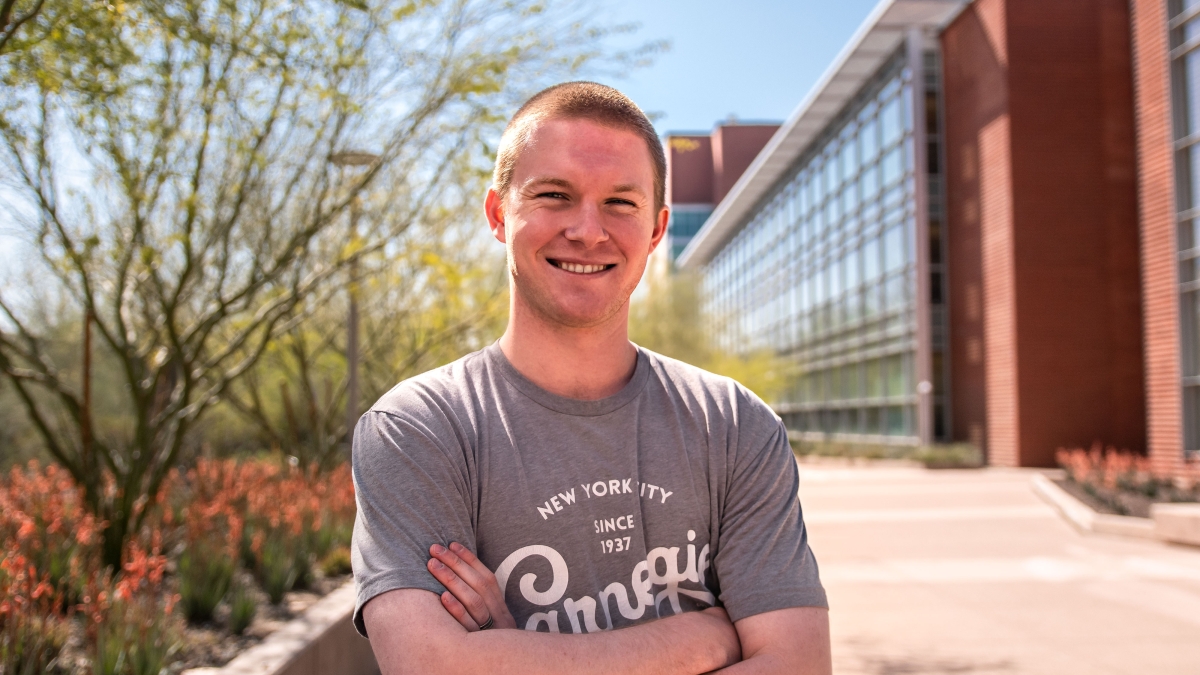During a high school psychology class, Arizona State University student Shane Marohnic remembers watching instructional videos from Doug Kenrick, President’s Professor in the Department of Psychology. Marohnic, a senior in the psychology department, now works as a research assistant in Kenrick’s lab where he is instrumental in keeping daily lab operations running smoothly.
“Shane is a great student. He took my graduate seminar, even though he’s still an undergraduate, and really seems to take great pleasure in learning and expanding his horizons. He’s also an incredibly pleasant guy,” Kenrick said. “Given all of his personal and intellectual characteristics, we made him our first assistant lab manager last year.”
Marohnic credits his research work ethic at ASU to a summer spent working as a lot tracker at a fishing plant in Valdez, Alaska. The 16-hour workdays and hands-on learning, from grading and gutting fish to packing and shipping logistics, led him to appreciate hard work.
He had always been a bit of an adventurer and found himself on his own version of “Into the Wild.” It was unlike anything he had ever done before, so he jumped at the chance for some personal discovery.
“It was the end of my freshman year and I wanted to try something new and exciting, and I thought, 'Why not?'” Marohnic said.
“I really wasn’t expecting work in the fishing industry to mirror the research environment, but it ended up being a good introduction to why each step is important in research,” Marohnic said. “It was an amazing experience that I wouldn’t trade for anything — even if everything I owned smelled like fish by the end of it.”
Lots of Marohnic’s family studied psychology in college, and he always knew he would end up in a similar path.
“I’ve always been fascinated by the way we act and the reasons behind it. Everyone thinks about these broad questions, but few actually take the time to study them,” Marohnic said. “I’ve always wanted to know things like, why is this person being ostracized from the group, or why is this person prone to drinking and this one isn’t?”
His sense of adventure is mirrored in his passion for new discovery in research.
In addition to Kenrick’s lab, Marohnic also works in the Behavioral Alcohol Research for Clinical Advancement (BARCA) lab, led by ASU’s Will Corbin, associate professor of psychology and director of clinical training.
Related: Where and with whom you drink matters
Marohnic wants to pursue his doctorate in clinical psychology and is particularly interested in how impulsivity plays into decision making, specifically around alcohol. In Corbin’s BARCA lab, he is studying situational factors that alter drinking behavior like environmental stimulation — such as in tailgates or parties. Additionally, he is investigating the phenomena of “positive urgency,” or the ill-advised behavior that is motivated during extreme positive moods, and how it may be associated with heavier drinking.
“In the research lab, Shane is always up for a new challenge. From his first day in the lab, he has been one of the first to volunteer to take on a new task, even if he doesn’t have prior experience with that task,” said Corbin. “He has also shown tremendous intellectual curiosity, quickly getting involved in developing his own ideas and pursuing independent research projects. His goal is to have a manuscript ready for submission by early fall and I have no doubt that he will achieve that goal.”
More Science and technology

Brilliant move: Mathematician’s latest gambit is new chess AI
Benjamin Franklin wrote a book about chess. Napoleon spent his post-Waterloo years in exile playing the game on St. Helena. John…

ASU team studying radiation-resistant stem cells that could protect astronauts in space
It’s 2038.A group of NASA astronauts headed for Mars on a six-month scientific mission carry with them personalized stem cell…
Largest genetic chimpanzee study unveils how they’ve adapted to multiple habitats and disease
Chimpanzees are humans' closest living relatives, sharing about 98% of our DNA. Because of this, scientists can learn more about…
